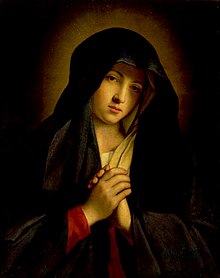ජේසුගේ මව වන මරියා
මරියා (හීබෲ: מִרְיָם, romanized: Mīryām; අරාබි: مريم; පුරාතන ග්රීක: Μαρία, romanized: María; ලතින්: Maria); යනු විවිධ මාතෘකා, ශෛලීන් සහ ගෞරව නාම වලින් ද හඳුන්වනු ලබන 1වන සියවසේ නාසරෙත්හි ජීවත්වූ කාන්තාවකී.[1][2] ඇය සාන්ත ජෝසප්ගේ භාර්යාවද, ජේසුගේ මවද විය. බයිබලයේ නව ගිවිසුම,[b] කුරානය, මෝර්මන්ගේ පොත, සහ කිටාබ්-ඉ-අක්දාස් මරියා කන්යාවක් ලෙස විස්තර කරයි. ක්රිස්තියානි දේවධර්මයට අනුව, මරියා කන්යාවක්ව සිටියදීම ශුද්ධාත්මයාණන් කරණකොටගෙන ජේසුස්ව පිළිසිඳ ගත්තේය.[6]
මරියා(මේරී) | |
|---|---|
 17වන සියවසේදී ජියොවනි සසොෆෙරාටෝ විසින් ඇඳි වික්ශෝප මාතාව | |
| උපත | ආ. 18 BC |
| මියගිය දිනය | after ආ. 30/33 AD |
| කලත්රයා(යන්) | ජෝසප් |
| දරුවන් | ජේසු[a] |
| දෙමව්පියන්(s) | සමහර අප්රකට ලියවිලිවලට අනුව ජෝකීම් සහ ආනා |
Mary has been venerated since early Christianity, and is considered by millions to be the holiest and greatest saint for being chosen by God to bear and raise Jesus. The Eastern and Oriental Orthodox, Catholic, Anglican, and Lutheran churches believe that Mary, as mother of Jesus, is the Theotokos (Mother of God; Θεοτόκος). There is significant diversity in the Marian beliefs and devotional practices of major Christian traditions. The Catholic Church holds distinctive Marian dogmas, namely her status as the Mother of God, her Immaculate Conception, her perpetual virginity, and her Assumption into heaven.[7] Many Protestants minimize Mary's role, because of the alleged lack of biblical support for any beliefs other than the virgin birth.[8]
Mary also has the highest position in Islam among all women.[9][10][11] She is mentioned in the Quran more often than in the Bible,[12] where two of the longer chapters of the Quran are named after her and her family.[13]
According to Catholic and Eastern Christian teachings, at the end of her earthly life, God raised Mary's body into heaven; this is known in the Christian West as the Assumption of Mary,[14][15] and in the East as the Dormition of the Mother of God. She is said to have miraculously appeared to believers many times over the centuries.
මූලාශ්ර
සංස්කරණය- ^ Raymond Edward Brown; Joseph A. Fitzmyer; Karl Paul Donfried (1978). Mary in the New Testament. NJ: Paulist Press. p. 140. ISBN 9780809121687. 17 August 2021 දින පැවති මුල් පිටපත වෙතින් සංරක්ෂිත පිටපත. සම්ප්රවේශය 23 February 2021.
...consonant with Mary's Jewish background
- ^ "Nazareth". britannica.com. Encyclopedia Britannica. 17 December 2021 දින පැවති මුල් පිටපත වෙතින් සංරක්ෂිත පිටපත. සම්ප්රවේශය 11 July 2020.
- ^ Matthew 1:23
- ^ Isaiah 7:14
- ^ Bauercc/(Arndt)/Gingrich/Danker, A Greek-English Lexicon of the New Testament and Other Early Christian Literature, Second Edition, University of Chicago Press, 1979, p. 627.
- ^ Ruiz, Jean-Pierre. "Between the Crèche and the Cross: Another Look at the Mother of Jesus in the New Testament". New Theology Review; Aug. 2010, Vol. 23, Issue 3, pp. 3–4
- ^ "Mary, the mother of Jesus." The New Dictionary of Cultural Literacy, Houghton Mifflin. Boston: Houghton Mifflin, 2002. Credo Reference. Web. 28 September 2010.
- ^ උපුටාදැක්වීම් දෝෂය: අනීතික
<ref>ටැගය;protestantencyclopediaනමැති ආශ්රේයන් සඳහා කිසිදු පෙළක් සපයා නොතිබුණි - ^ Quran 3:42; cited in Stowasser, Barbara Freyer, "Mary", in: Encyclopaedia of the Qurʾān, General Editor: Jane Dammen McAuliffe, Georgetown University, Washington DC.
- ^ J.D. McAuliffe, Chosen of all women
- ^ J.-M. Abd-el-Jalil, Marie et l'Islam, Paris 1950
- ^ Esposito, John. What Everyone Needs to Know About Islam. New York: University Press, 2002. P31.; cf. Stowasser, Barbara Freyer, "Mary", in: Encyclopaedia of the Qurʾān, General Editor: Jane Dammen McAuliffe, Georgetown University, Washington DC.
- ^ Jestice, Phyllis G. Holy people of the world: a cross-cultural encyclopedia, Volume 3. 2004 ISBN 1-57607-355-6 page 558 Sayyidana Maryam සංරක්ෂණය කළ පිටපත 27 ජූලි 2020 at the Wayback Machine
- ^ Munificentissimus Deus: Dogma of the Assumption by Pius XII, 1950, 17
- ^ Holweck, Frederick (1907), The Feast of the Assumption,(The Catholic Encyclopedia), 2, New York: Robert Appleton Company, https://www.newadvent.org/cathen/02006b.htm, ප්රතිෂ්ඨාපනය 19 April 2015, access date 18 April 2015
උපුටාදැක්වීම් දෝෂය: "lower-alpha" නම් කණ්ඩායම සඳහා <ref> ටැග පැවතුණත්, ඊට අදාළ <references group="lower-alpha"/> ටැග සොයාගත නොහැකි විය.